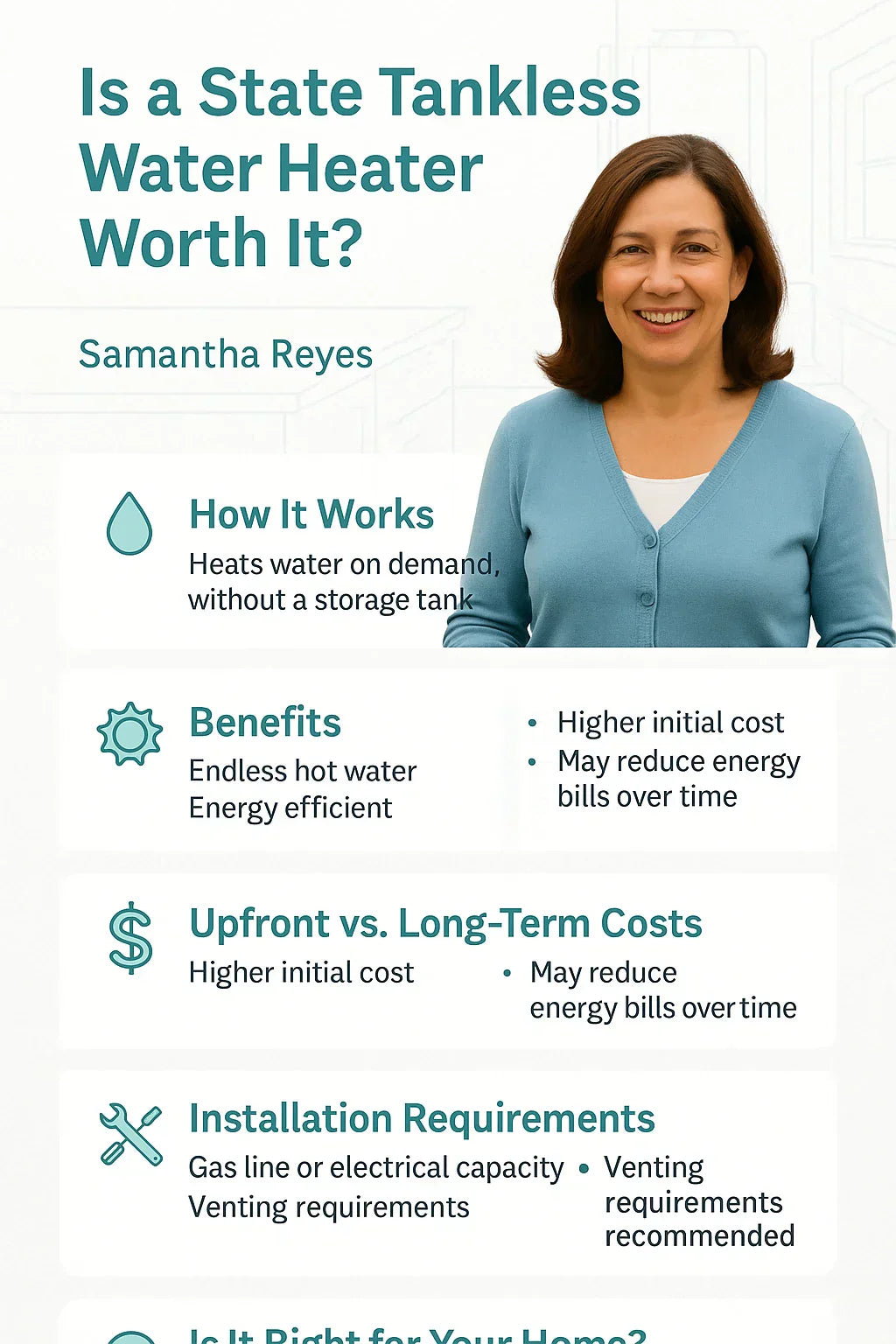Tankless water heaters have become a popular upgrade for homeowners looking to save on energy bills and enjoy endless hot water. If you’re considering making the switch, State tankless water heaters are among the most reliable options available in 2025.
This guide will help you decide if a State tankless water heater is worth it for your home, exploring installation needs, upfront vs. long-term costs, maintenance, and whether tankless aligns with your lifestyle and budget.
🔥 How a State Tankless Water Heater Works
Unlike traditional tank water heaters that store and constantly heat water, tankless systems heat water only when you need it:
-
Water flows through a heat exchanger when a hot water tap is turned on.
-
Gas burners or electric elements heat the water instantly.
-
Hot water is delivered continuously until the tap is turned off.
Advantages:
✅ Endless hot water.
✅ Lower standby energy losses.
✅ Compact design for wall installation.
Learn more: Energy.gov - Tankless Water Heaters
🕒 Benefits of Switching to a State Tankless Water Heater
1. Endless Hot Water
No more cold showers when multiple appliances run simultaneously.
2. Energy Savings
Tankless water heaters can reduce energy consumption by 24-34% compared to conventional tanks, depending on water usage.
3. Longer Lifespan
State tankless models can last 20 years or more, while tank models typically last 10-15 years.
4. Space Savings
Compact, wall-mounted designs free up utility closet or garage space.
For additional savings estimates: Energy Star - Water Heater Savings
💸 Upfront Costs vs. Long-Term Savings
Upfront Costs
-
State tankless water heaters: $900 - $1,800 depending on GPM capacity and efficiency ratings.
-
Installation costs can range from $800 - $1,500, including venting and gas line upgrades.
Long-Term Savings
-
Lower energy bills, particularly in homes with moderate to high hot water use.
-
Less frequent replacement reduces long-term equipment costs.
Calculate personalized savings using the Energy Star Water Heater Calculator.
🛠️ Installation Requirements for State Tankless Units
-
Gas Line Capacity: Tankless units often require a larger gas line to deliver sufficient BTUs.
-
Venting: Requires proper venting to remove combustion gases safely.
-
Electrical Needs: Some units need dedicated circuits or voltage checks.
-
Water Softening: In hard water areas, a softener may be recommended to protect the heat exchanger.
Professional installation is strongly recommended to ensure safety, efficiency, and warranty compliance.
📈 Is Your Home a Good Fit for Tankless?
Ideal Homes:
✅ High hot water demand (multiple showers, laundry, dishwasher running simultaneously).
✅ Households planning long-term residence.
✅ Homes with limited utility space.
Potential Challenges:
⚠️ Higher upfront costs.
⚠️ May require gas line or electrical upgrades.
⚠️ Not ideal if your home has very low hot water usage, where energy savings may be minimal.
If you’re unsure, consult your plumber to assess your home’s water usage patterns.
🧰 Maintenance Requirements
Annual Maintenance Includes:
-
Flushing the system to remove scale and mineral buildup.
-
Cleaning or replacing inlet filters.
-
Inspecting venting systems and gas connections.
Hard Water Considerations:
If you live in an area with hard water, regular descaling (or a whole-home water softener) will extend the life of your State tankless unit.
Proper maintenance ensures you receive the full energy efficiency and longevity of your investment.
For maintenance guidelines, visit: State Water Heaters Maintenance Resources
📊 Comparing State Tankless Models
State offers a variety of gas and electric tankless models with varying capacities:
| Model | Max GPM | Energy Factor | Suitable For |
|---|---|---|---|
| State Tankless Gas Model A | 6.6 | 0.93 | Small to medium homes |
| State Tankless Gas Model B | 9.5 | 0.95 | Large homes, high demand |
| State Electric Tankless | 3.5 | 0.98 | Point-of-use or low demand |
All models include:
✅ Digital temperature control.
✅ Compact wall-mounted design.
✅ Advanced safety features.
See available models on The Furnace Outlet.
🔗 Rebates and Incentives
State tankless water heaters often qualify for:
-
Federal tax credits.
-
Utility company rebates.
-
Local energy efficiency incentives.
Check your eligibility using DSIRE and Energy Star.
✅ Conclusion: Is a State Tankless Water Heater Worth It?
A State tankless water heater is worth it if: ✅ You have moderate to high hot water demand.
✅ You plan to stay in your home for many years.
✅ You want lower energy bills and endless hot water.
✅ You value the extra space in your utility closet.
It may not be ideal if you have low hot water usage or if upfront costs are a major barrier.
Next Steps:
-
Measure your current hot water usage.
-
Assess your utility space and gas line capacity.
-
Review available State tankless models on The Furnace Outlet.
-
Schedule a consultation with your plumber for final sizing and installation planning.
-
Check rebates to reduce your initial investment.
By taking these steps, you can confidently decide if a State tankless water heater aligns with your home’s needs and your goals for comfort, efficiency, and long-term savings.
In the next topic we will read more about: How to Size Your State Water Heater: BTUs, Gallons & First Hour Rating Explained







